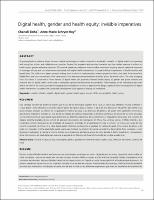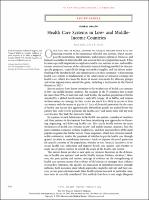Browsing by Subject "Health systems"
Now showing items 1-5 of 5
-
Associations between the stringency of COVID-19 containment policies and health service disruptions in 10 countries
(2023-04-12)
Background: Disruptions in essential health services during the COVID-19 pandemic have been reported in several countries. Yet, patterns in health service disruption according to country responses remain unclear. In this paper, we investigate associations between the stringency of COVID-19 containment policies and disruptions in 31 health services in 10 low- middle- and high-income countries in 2020. Methods: Using routine health information systems and administrative data from 10 countries (Chile, Ethiopia, Ghana, Haiti, Lao People’s Democratic ... -
Digital health, gender and health equity: invisible imperatives
(Journal of Public Health, 2018-12-01)
A growing body of evidence shows the use of digital technologies in health—referred to as eHealth, mHealth or ‘digital health’—is improving and saving lives in low- and middle-income countries. Despite this prevalent and persistent narrative, very few studies examine its effects on health equity, gender and power dynamics. This journal supplement addresses these invisible imperatives by going beyond traditional measures of coverage, efficacy and cost-effectiveness associated with digital health interventions, to unpack different experiences of ... -
Health care systems in low- and middle-income countries
(Massachusetts Medical Society, 2014-02-06)
This review draws on what is now quite an extensive literature on the deficiencies of health care systems and on the Health Systems Evidence database. However, the poor quality and uneven coverage of evidence on the strengthening of health care systems means that evidence of deficiencies is stronger than evidence of remedies. Moreover, the specific circumstances of individual countries strongly influence both decisions about which approaches might be relevant and their success, so any generalizations made from health systems research in particular ... -
Measuring health equity in the ASEAN region: conceptual framework and assessment of data availability
(2023-12-05)
Background: Existing research on health equity falls short of identifying a comprehensive set of indicators for measurement across health systems. Health systems in the ASEAN region, in particular, lack a standardised framework to assess health equity. This paper proposes a comprehensive framework to measure health equity in the ASEAN region and highlights current gaps in data availability according to its indicator components. Methods: A comprehensive literature review was undertaken to map out a core set of indicators to evaluate health ... -
Tracking health system performance in times of crisis using routine health data: lessons learned from a multicountry consortium
(2023-01-31)
COVID-19 has prompted the use of readily available administrative data to track health system performance in times of crisis and to monitor disruptions in essential healthcare services. In this commentary we describe our experience working with these data and lessons learned across countries. Since April 2020, the Quality Evidence for Health System Transformation (QuEST) network has used administrative data and routine health information systems (RHIS) to assess health system performance during COVID-19 in Chile, Ethiopia, Ghana, Haiti, Lao ...




